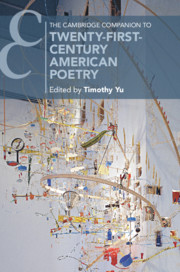Book contents
- The Cambridge Companion to Twenty-First-Century American Poetry
- The Cambridge Companion to Twenty-First-Century American Poetry
- Copyright page
- Contents
- Notes on Contributors
- Chronology
- Introduction
- 1 New Black Aesthetics: Post–Civil Rights African American Poetry
- 2 Traditions of Innovation in Asian American Poetry
- 3 Locations of Contemporary Latina/o Poetry
- 4 Sovereign Poetics and Possibilities in Indigenous Poetry
- 5 Changing Topographies, New Feminisms, and Women Poets
- 6 The Nearly Baroque in Contemporary Poetry
- 7 Disability Aesthetics and Poetic Practice
- 8 Queer Poetry and Bioethics
- 9 Trauma and the Avant-Garde
- 10 Blockade Chants and Cloud-Nets: Terminal Poetics of the Anthropocene
- 11 Give Me Poems and Give Me Death: On the End of Slam(?)
- 12 Anti-capitalist Poetry
- 13 Of Poetry and Permanent War in the Twenty-First-Century
- 14 Poetry in the Program Era
- 15 The Future of Poetry Studies
- Further Reading
- Index
- Cambridge Companions to …
- References
1 - New Black Aesthetics: Post–Civil Rights African American Poetry
Published online by Cambridge University Press: 25 February 2021
- The Cambridge Companion to Twenty-First-Century American Poetry
- The Cambridge Companion to Twenty-First-Century American Poetry
- Copyright page
- Contents
- Notes on Contributors
- Chronology
- Introduction
- 1 New Black Aesthetics: Post–Civil Rights African American Poetry
- 2 Traditions of Innovation in Asian American Poetry
- 3 Locations of Contemporary Latina/o Poetry
- 4 Sovereign Poetics and Possibilities in Indigenous Poetry
- 5 Changing Topographies, New Feminisms, and Women Poets
- 6 The Nearly Baroque in Contemporary Poetry
- 7 Disability Aesthetics and Poetic Practice
- 8 Queer Poetry and Bioethics
- 9 Trauma and the Avant-Garde
- 10 Blockade Chants and Cloud-Nets: Terminal Poetics of the Anthropocene
- 11 Give Me Poems and Give Me Death: On the End of Slam(?)
- 12 Anti-capitalist Poetry
- 13 Of Poetry and Permanent War in the Twenty-First-Century
- 14 Poetry in the Program Era
- 15 The Future of Poetry Studies
- Further Reading
- Index
- Cambridge Companions to …
- References
Summary
If African American poets have achieved a new kind of freedom in the twenty-first century, they have also pursued multiple styles through their modes of introspection. This broader inward-turning is continuous with the defining priorities of the Black Arts Movement, a principle that might be more aptly named self-determination. Contemporary African American poets have embraced black culture as a historical and cultural landscape to be mapped into new frontiers in order to make the individual black self and then to develop terms for the liberation of that self. These pursuits of self-examination and self-determination comprise at least four broad and overlapping realms of practice: apolitical introspection; a rethinking of African American history and heritage beyond the terms of simple affirmation; a personalized mode of collectivist protest in line with Black Arts Movement practices; and a black literary collective action enacted by the numerous African American writers collectives and workshops that have arisen since the 1960s. Poets discussed include Gregory Pardlo, Natasha Trethewey, Tyehimba Jess, Patricia Smith, Nikky Finney, Nathaniel Mackey, alongside groups such as Cave Canem and movements like #BlackPoetsSpeakOut.
- Type
- Chapter
- Information
- Publisher: Cambridge University PressPrint publication year: 2021
References
Works Cited
- 2
- Cited by



